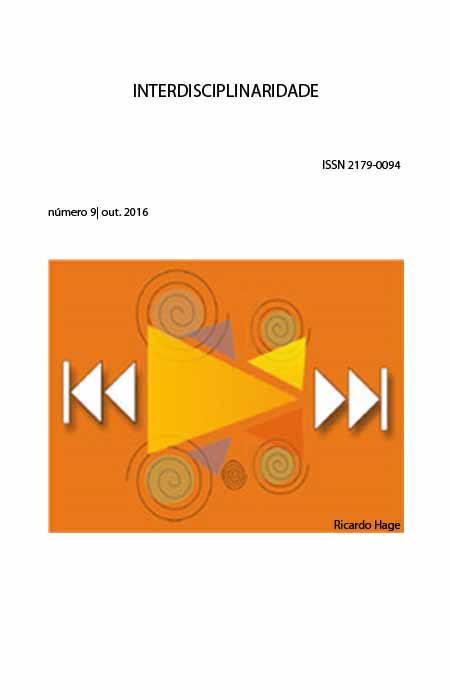SCHOOL CURRICULUM , IDENTITY and GLOBALIZATION: challenges and pathways to the educator in contemporary times.
Keywords:
curriculum, globalization, Identities, interdisciplinarity.Abstract
This article raises reflection on new challenges and paths to an educator in contemporary times by correlating the curriculum course, globalization and identity formation in the school context. It allows the understanding that curricular theories are developed by the transformations of man, in the political, economic and cultural setting, as well as the educators participating in the process of forming students's identities. It discusses globalization, even if it is an ideology, provokes changes and creates ‘forces’, or ‘battles’ to the educator in their daily lives, bringing a conflictive educational field between the existing model and the new emerging paradigms. As a path to these challenges, it is suggested a work based on interdisciplinary permeated by self-knowledge. This process is represented symbolically by the ' Trojan horse ' because according to the story told in the book ' the Iliad ' by Homer, it is one of the main symbols of the famous Trojan war used as a strategy by the Greeks to defeat the Trojans. The Greek Warrior Odysseus had the idea of building a huge horse and gave it to the Trojans as a symbolic gesture of surrender. The Trojans accepted the ' gift ' and led the horse into the walls of Troy. Hundreds of Greek soldiers left the horse and attacked the city. So, the metaphor includes at the same time, obscure, unconscious aspects, ‘surprise ' elements and creative features that can be revealed in this 'field of struggles’ in the educational context. In this way, the interdisciplinary attitude and self-knowledge would facilitate the expansion of the teacher´s consciousness towards the promotion of learning facilitators to bring out autonomous subjects integrated with their nature and essence.Metrics
References
BURBULES, Nicholas, TORRES, Carlos Alberto (org). Globalização e educação: perspectivas crítica. Porto Alegre: Artmed Editora, 2004.
CIAMPA, Antonio da C. A estória do Severino e a história da Severina. São Paulo: Ed. Brasiliense, 1987.
FAZENDA, Ivani Catarina Arantes. Interdisciplinaridade: História, Teoria e Pesquisa. 2. ed. Campinas: SP: Papirus, 1995.
______. Dicionário em construção: interdisciplinaridade, 2. ed. SP, São Paulo: Cortez, 2002.
______.Interdisciplinaridade: qual é o sentido? São Paulo: Paulus, 2003.
HAMILTON, David. Mudança Social e mudança pedagógica: a trajetória de uma pesquisa histórica. In Teoria e Educação, v. 6, Porto Alegre: Pannonica, 1992a.
HAMILTON, David. Sobre as origens do termo classe e curriculum. Teoria e Educação, v. 6, Porto Alegre, Pannonica, 1992b.
MOREIRA, A. F.; SILVA, T. T. (Orgs.). Currículo, cultura e sociedade. São Paulo: Cortez, 1994.
SACRISTÁN, J. Gimeno. Poderes instáveis em educação. Trad. Beatriz Affonso. Porto Alegre: Artes Médicas Sul, 1999.
SANTOMÉ, Torres Jurjo. Currículo escolar e Justiça social: o cavalo de Tróia da Educação. Trad.: Alexandre Salvaterra. Porto Alegre: Penso, 2013.
SILVA, Tomaz Tadeu da. Documentos de identidade: uma introdução às teorias do currículo. 4. ed. Belo horizonte: Autêntica, 2004.
Downloads
Published
How to Cite
Issue
Section
License
Os autores concedem à revista todos os direitos autorais referentes aos trabalhos publicados. Os conceitos emitidos em artigos assinados são de absoluta e exclusiva responsabilidade de seus autores. A Revista Interdisciplinaridade e os textos aqui publicados estão licenciados com uma Licença Creative Commons Attribution-NoDerivatives 4.0 International. Baseado no trabalho disponível em http://revistas.pucsp.br/interdisciplinaridade. Podem estar disponíveis autorizações adicionais às concedidas no âmbito desta licença em http://revistas.pucsp.br/interdisciplinaridade.
A Revista Interdisciplinaridade e os textos aqui publicados estão licenciados com uma Licença Creative Commons Attribution-NoDerivatives 4.0 International. Baseado no trabalho disponível em http://revistas.pucsp.br/interdisciplinaridade. Podem estar disponíveis autorizações adicionais às concedidas no âmbito desta licença em http://revistas.pucsp.br/interdisciplinaridade.


